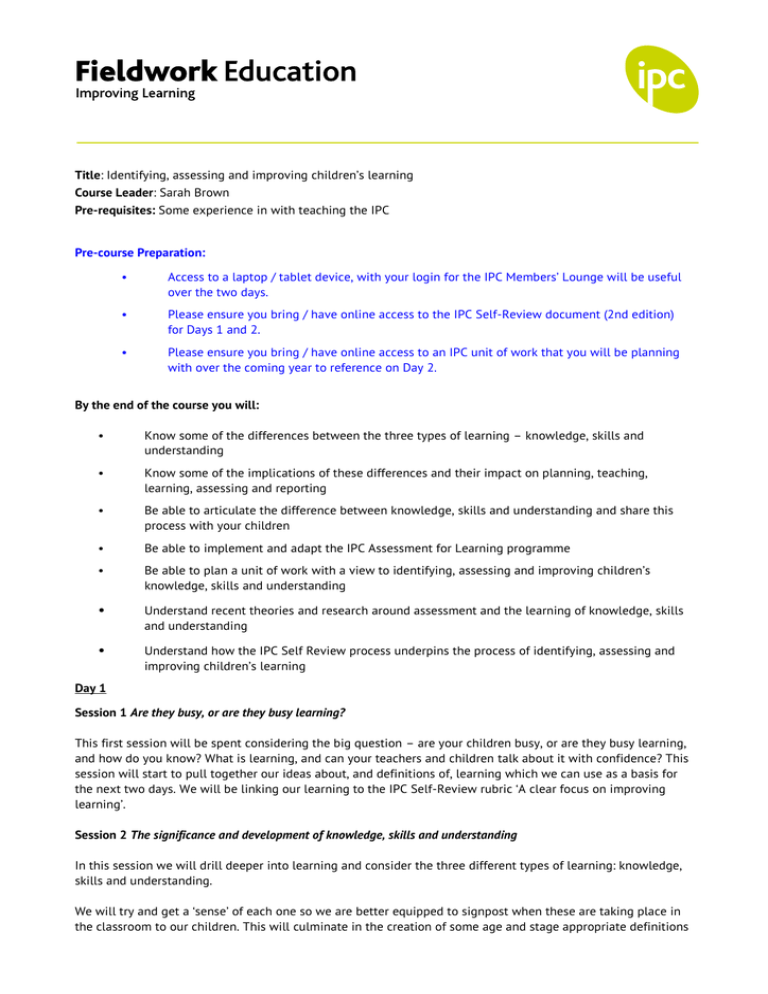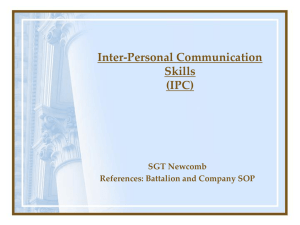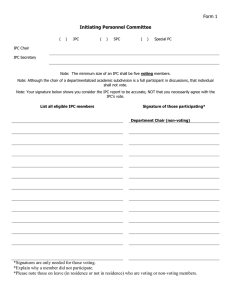course info
advertisement

Title: Identifying, assessing and improving children’s learning Course Leader: Sarah Brown Pre-requisites: Some experience in with teaching the IPC Pre-course Preparation: • Access to a laptop / tablet device, with your login for the IPC Members’ Lounge will be useful over the two days. • Please ensure you bring / have online access to the IPC Self-Review document (2nd edition) for Days 1 and 2. • Please ensure you bring / have online access to an IPC unit of work that you will be planning with over the coming year to reference on Day 2. By the end of the course you will: • Know some of the differences between the three types of learning – knowledge, skills and understanding • Know some of the implications of these differences and their impact on planning, teaching, learning, assessing and reporting • Be able to articulate the difference between knowledge, skills and understanding and share this process with your children • Be able to implement and adapt the IPC Assessment for Learning programme • Be able to plan a unit of work with a view to identifying, assessing and improving children’s knowledge, skills and understanding • Understand recent theories and research around assessment and the learning of knowledge, skills and understanding • Understand how the IPC Self Review process underpins the process of identifying, assessing and improving children’s learning Day 1 Session 1 Are they busy, or are they busy learning? This first session will be spent considering the big question – are your children busy, or are they busy learning, and how do you know? What is learning, and can your teachers and children talk about it with confidence? This session will start to pull together our ideas about, and definitions of, learning which we can use as a basis for the next two days. We will be linking our learning to the IPC Self-Review rubric ‘A clear focus on improving learning’. Session 2 The significance and development of knowledge, skills and understanding In this session we will drill deeper into learning and consider the three different types of learning: knowledge, skills and understanding. We will try and get a ‘sense’ of each one so we are better equipped to signpost when these are taking place in the classroom to our children. This will culminate in the creation of some age and stage appropriate definitions that you can share with your children. We will be linking our learning to the IPC Self-Review rubric ‘The significance and development of knowledge, skills and understanding’. Session 3 What does research tell us about knowledge, skills and understanding? We’ll end the day by looking into what recent research can tell us about knowledge, skills and understanding, and how this can help us with day-to-day learning and teaching. We will be referencing the work of Daniel T Willingham, John Hattie, Daisy Christodoulou, and Shirley Clarke, amongst others. Session 4 Implementing and adapting the IPC Assessment for Learning Programme We will start the day by exploring the IPC Assessment for Learning Programme (which supports assessment of skills) and look at ways to implement and adapt the programme to support the needs of your children. We will consider the challenges of what to assess, when and how often. We will be linking our learning to the IPC Self-Review rubric ‘Assessment that improves learning’. Session 5 Assessing and reporting with knowledge, skills and understanding How do we assess knowledge, skills and understanding? And what does this mean for our reporting processes? We will take some time to explore methods for assessing and evaluating knowledge and understanding, looking at some of the methods being implemented by other schools. We will be linking our learning to the IPC Self-Review rubric ‘Assessment that improves learning’. Session 6 Planning for knowledge, skills and understanding In this final session we will review everything we have learned so far and think about what this means for the medium term planning process. Opportunities to learn and develop knowledge, skills and understanding don’t just happen – we need to purposefully plan for them. But how do we make sure this is manageable for both the children and the teachers? We will identify the ‘core’ knowledge, skills and understanding that we want children to take away from a unit, and plan in opportunities to develop and assess these accordingly in each lesson.

